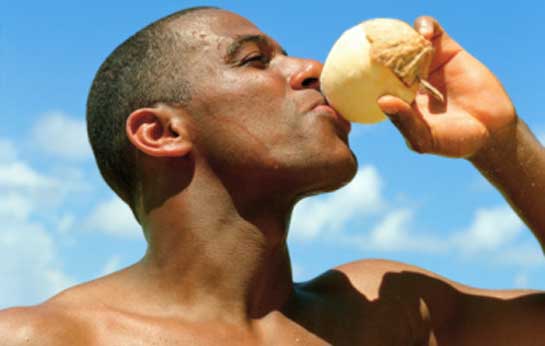
By NATALIE DIGATE MUTH, M.D., M.P.H., R.D.
The 2010 Malibu International Marathon boasted breathtaking views amongst the Santa Monica mountains and the Pacific Ocean, a comfortable and breezy climate, an initially fast course studded with rocky passageways and beach-front mansions, and…all-you-can-drink coconut water? In keeping with its theme of tropical paradise, Gatorade, Powerade and other various sugar-heavy electrolyte replacements typically offered every couple of miles along a 26.2-mile course were replaced with all-natural coconut water. Described on the marathon Web site as “more effective for full-body replenishment and contain[ing] none of the added sugars and calories commonly associated with traditional sports drinks,” the wildly popular beverage was the preferred electrolyte replacement source at this race. But is coconut water really better for refueling than your standard sports drinks? The answer, in short, is: It depends.
Not to be confused with coconut milk, which is made from coconut’s white flesh and is full of fat and calories, coconut water is the clear liquid at the fruit’s center. This water is low in calories (about 60 calories per 12-oz serving), high in potassium (more than the 450mg in a banana and about the amount of 15 servings of a sports drink), and contains modest amounts of other important electrolytes including sodium, magnesium, potassium and phosphorus. It also is free of added sugars, cholesterol and fat. Sounds like the perfect sports drink, doesn’t it? And in fact it may be for certain athletes, especially those engaging in short- to moderate-duration activities. Typically, potassium losses from one to two hours of exercise can be replaced with the potassium-equivalent of a banana (or a small glass of coconut water). However, athletes who engage in long-distance endurance activities in which sodium sweat losses can be significant (and more so than potassium losses) may be better off with a higher-sodium sports drink, or should supplement coconut water with a salty snack to help prevent hyponatremia (low blood levels of sodium). Also, during long-distance activities, ideally one would consume about 30 to 60 grams of an easily digestible carbohydrate per hour of exercise to keep a constant stream of blood glucose available to fuel the exercise bout. With the lower-calorie—and thus lower-carbohydrate—content of coconut water, a few ounces every couple of miles may not be adequate. (See sidebar for a comparison of carbohydrate and electrolyte content and cost of various sports drinks and coconut water.)
In addition to its use as a sports drink, coconut water manufacturers also boast of various other health benefits, including improved body-temperature regulation, smoother skin, boosted immune system, and decreased stomach pain. In reality, the research is lacking and there are few good studies available yet to confirm or deny these claims. (Given coconut water’s enhanced popularity, however, it is likely that research studies are underway.) Of note, coconut water has been used in many Asian, Latin- and South-American cultures for years as a medicinal agent and even as a source of intravenous electrolyte replacement. As the drink’s benefits and uses have become more widely known over the past several years, coconut water manufacturers have enjoyed an exponential boost in popularity. Initially occupying a niche market in the mid-2000s with a few small-time producers, the coconut water industry is now a multi-million-dollar-per-year enterprise with three major manufacturers: the independent Vita Coco (the product available at the Malibu marathon), Coca-Cola–owned Zico, and Pepsi-owned Amacoco (which is currently not available in the U.S). The manufacturers still purchase most of the coconut water from small, family-owned plantations in Latin America, Brazil, Indonesia and Asia, where young, green coconuts are harvested. The water is then extracted from the fruit and pasteurized, bottled and shipped for resale around the world.
Although coconut water is relatively new on the fitness scene, it has a devoted following of athletes who enjoy the taste, the natural ingredients, and its replenishing capabilities, especially during shorter-duration activities. As coconut water begins to appear at more water stops and booths at races and events across the country, its popularity will no doubt continue to grow. However, it is important to keep in mind that even though it may be offered at an event it may not be the best source of replenishment and fuel for all participants. Athletes can best ensure optimal performance by planning ahead and making sure that the nutritional content of their replacement fluids and snacks match the demands of their sport.
|
Sports Drinks vs. Coconut Water: A Comparison of Electrolytes, Carbohydrate and Price
|
| Drink (8oz) |
Calories |
Electrolytes* |
Carbohydrate |
Approximate Price |
| Vita Coco coconut Water |
43 |
Na 25mg
K 471mg
|
11g |
$2.00/11.2oz bottle |
| Zico coconut water |
34 |
Na 91mg
K 325mg |
7.4g |
$2.50/14oz bottle
|
| Glaceau Smart Water |
50 |
Na 0mg
K 0mg |
5.2g |
$1.60/34oz bottle |
| Gatorade |
50 |
Na 110mg
K 30mg |
14g |
$1.29/20oz bottle |
| Gatorade G2 |
20 |
Na 110mg
K 30mg |
5g |
$1.29/20oz bottle |
| Powerade |
50 |
Na 100mg
K 25mg |
14g |
$1.00/20oz bottle |
| Powerade Zero |
0 |
Na 55mg
K 35mg |
0g |
$1.00/20oz bottle |
|
*Na=sodium, K=potassium
|
________________________________________________________________________

Natalie Digate Muth, M.D., M.P.H., R.D., is a pediatrics resident at UCLA Mattel Children’s Hospital, a registered dietitian, an ACE-certified Personal Training and Group Fitness Instructor, and spokesperson for the American Council on Exercise.